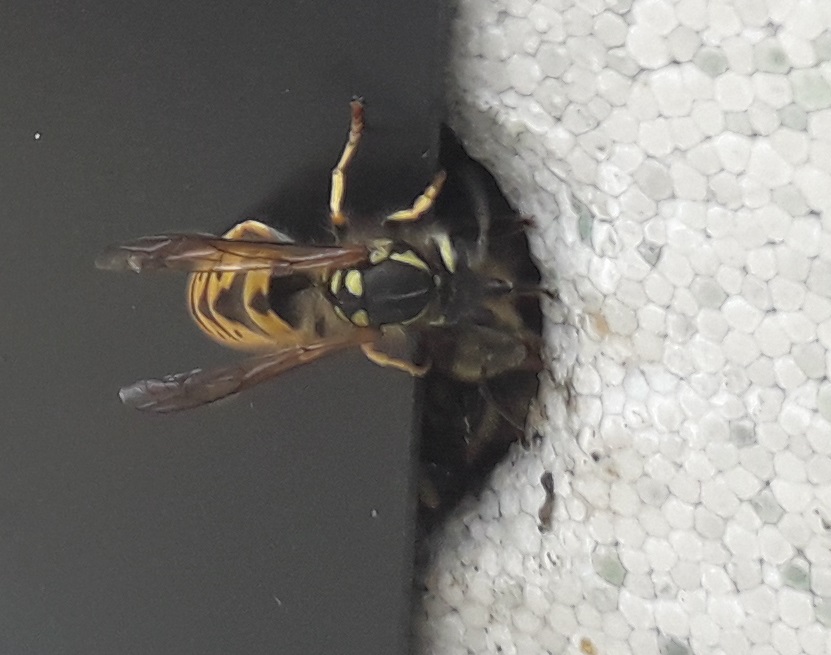 Abraham Lincoln
If given the truth, the people can be depended upon to meet any national crisis...
Abraham Lincoln
If given the truth, the people can be depended upon to meet any national crisis...
 Guildford news...
for Guildford people, brought to you by Guildford reporters - Guildford's own news service
Guildford news...
for Guildford people, brought to you by Guildford reporters - Guildford's own news service
Beekeeper’s Notes: Wasps On The Rampage Again
Published on: 1 Sep, 2020
Updated on: 1 Sep, 2020
Hugh Coakley keeps bees in Worplesdon
The wasps are at it again. Desperate for food in the last knockings of their short existence, they are investigating anything sweet and sticky to keep them going (see Beekeeper’s Notes September ’17: Marauding wasps, honey and a lot going on).

A wasp on a honey-robbing mission being repulsed by a honeybee guard blocking the hive entrance. Click on the image to enlarge it in a new window.
Jam jars, beer bottles and fizzy drinks bring them droning around our heads and we all recognise the signs; head jerking away from the buzz, frantic flapping of hands and a low, crouching run to escape.
But it isn’t just us humans who are affected. It can be a life and death struggle for the poor old honey bee. They have the honey, the sweet carbohydrate the wasps crave and they are willing to fight to get it.
I have heard at least one report this year in Guildford of a strong honeybee hive completely cleared out by the robber wasps in a day. Usually, it is the smaller and weaker colonies that get attacked being less able to defend themselves but not always.
It is fascinating to see the tactics used by both sides.
The wasps weave from side to side outside the bees’ entrance, looking for a chance to dart inside. The bees post guards to inspect all incomers and they challenge and tussle with anything that they don’t recognise.
Some wasps are repelled at the gate but, mysteriously, others are allowed to pass. I have been told that if a wasp can get in once, it picks up the hive’s scent on its body and then gets a free pass with unlimited entry. Plausible? I’m not sure.
Once they’re in though, they are ok. The bees don’t seem to recognise them as a threat once they are in and the wasp can go about the hive untroubled by the rightful owners.
The trick is to narrow the entrance to the hive down to one bee width. It makes it easier for the hive to protect itself, even the weakest of hives can afford to have one guard on duty.
Recent Articles
- Guildford Institute’s Crowdfunding Project for Accessible Toilet in its New Community and Wellbeing Centre
- Letter: Guildford – Another Opportunity Missed?
- Letter: GBC’s Corporate Strategy – Where Is the Ambition?
- My Memories of John Mayall at a Ground-breaking Gig in Guildford Nearly Six Decades Ago
- Westborough HMO Plans ‘Losing the Heart of the Street’ Says Resident
- College Invests to Boost Surrey’s Economy and Close Digital Skills Gap
- Community Lottery Brings Big Wins for Local Charities
- GBC Housing Plan Promises ‘A Vibrant Urban Neighbourhood’ Near Town Centre
- Hospital Pillows ‘Shortage’ at the Royal Surrey
- Updated: Caravans Set Up Camp at Ash Manor School


Search in Site
Media Gallery
Dragon Interview: Local Artist Leaves Her Mark At One of England’s Most Historic Buildings
January 21, 2023 / No Comment / Read MoreDragon Interview: Lib Dem Planning Chair: ‘Current Policy Doesn’t Work for Local People’
January 19, 2023 / No Comment / Read MoreA3 Tunnel in Guildford ‘Necessary’ for New Homes, Says Guildford’s MP
January 10, 2023 / No Comment / Read More‘Madness’ for London Road Scheme to Go Ahead Against ‘Huge Opposition’, Says SCC Leader
January 6, 2023 / No Comment / Read MoreCouncillor’s Son Starts Campaign for More Consultation on North Street Plan
December 30, 2022 / No Comment / Read MoreCounty Council Climbs Down Over London Road Works – Further ‘Engagement’ Period Announced
December 14, 2022 / No Comment / Read MoreDragon Interview: GBC Reaction to the Government’s Expected Decision to Relax Housing Targets
December 7, 2022 / No Comment / Read MoreHow Can Our Town Centre Businesses Recover? Watch the Shop Front Debate
May 18, 2020 / No Comment / Read More










Recent Comments